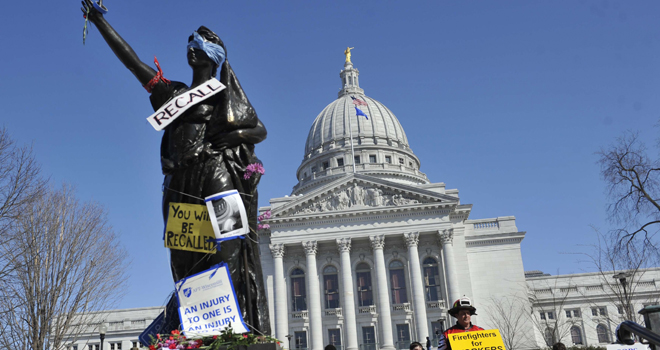The Wisconsin state Senate recalls of 2011 — in which tens of millions of dollars and countless man-hours were spent, almost resembling Congressional races — are officially over. Tuesday night, Democratic incumbents Jim Holperin and Robert Wirch fended off their Republican challengers, for a final state Senate margin of 17 Republicans to 16 Democrats, just shy of the Dems’ original goal of taking control of the chamber via recalls.
The Associated Press has projected both Holperin and Wirch as the winners in their respective races. With 78% of precincts reporting in Holperin’s race, he led Republican opponent Kim Simac by 54%-46%. With 99% reporting in Wirch’s race, he won by a margin of 57%-43%.
Holperin was always considered the most vulnerable Democrat. As the Milwaukee Journal Sentinel’s rankings of the state Senate districts shows, Holperin represents the most Republican-leaning district that is currently held by a Democrat. It voted 57.4%-40.8% for Scott Walker in the Republican wave of 2010, though before that Barack Obama carried it 52.7%-45.7% during the 2008 Democratic wave. But in the end, he pulled through the challenge, and by a wider margin than his original 51%-49% election to the seat in 2008.
Another fun fact: This was Holperin’s second recall of his political career. Back in 1990, then-state Rep. Holperin faced a recall election in a backlash over the more local issue of newly-reinstated Native American spearfishing rights. Holperin won that election, later went on to be state Tourism Secretary, and in 2008 was narrowly elected to the state Senate by 51%-49% in an open-seat race, to succeed a retiring Democrat.
After the 2010 Republican wave, the GOP picked up the governorship and both houses of the state legislature from previous Democratic control, with a 19-14 margin in the state Senate. Democrats mounted a backlash against Gov. Scott Walker’s anti-public employee union legislation, which itself had triggered massive protests throughout the state, and recall their way to a majority.
However, the Dems were hampered by the fact that the only recall-eligible districts were ones where the incumbents had won their terms in 2008, even during that year’s Democratic wave. Last Tuesday, when six Republicans were on the ballot, the Dems picked up two seats, just short of the magic three.
Obviously, these remaining races did not carry quite the same drama as last week’s contests, with it no longer being possible that majority control could flip. But on Tuesday, the Dems had to consolidate even those previous gains, for a new Republican majority of just 17-16, or be busted back down to the 19-14 margin that existed at the start of the year before they went for the massive, tens-of-millions of dollars effort to try to win the Senate.
Under Wisconsin’s recall law, elected officials must have served at least one year of their current term before being recalled — thus exempting the half of the Senate that was just elected in 2010. With half of the state Senate up for election every two years, this meant that only those senators who were last elected in 2008 could be targeted for recalls. Both parties waged signature campaigns in all 16 eligible districts, targeting eight Republicans and eight Democrats, with the final result being that six Republicans and three Democrats had recalls triggered against them.
In order to initiate a recall, signatures of at least 25 percent of the number of voters in the previous gubernatorial election, within the targeted district, must be collected in a 60-day window.
Back in July, Democratic state Sen. Dave Hansen easily won re-election in his recall race against a very flawed GOP challenger, after the party’s originally recruited candidate failed to collect enough valid petition signatures to get onto the ballot. Then last week, Democrats picked up two seats, defeating GOP state Sens. Dan Kapanke and Randy Hopper — but narrowly lost in two other targeted races, and by double-digit margins to the GOP incumbents in the remaining two.
Democrats still hope to go for the big target next year – a recall of Walker himself. For now, it remains to be seen whether they will be able to sustain the kind of political momentum and enthusiasm necessary for that task.
Get the day’s best political analysis, news and reporting from the TPM team delivered to your inbox every day with DayBreaker. Sign up here, it takes just a few seconds.









